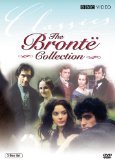| Reviews & Columns |
|
Reviews DVD TV on DVD Blu-ray 4K UHD International DVDs In Theaters Reviews by Studio Video Games Features Collector Series DVDs Easter Egg Database Interviews DVD Talk Radio Feature Articles Columns Anime Talk DVD Savant Horror DVDs The M.O.D. Squad Art House HD Talk Silent DVD
|
DVD Talk Forum |
|
|
| Resources |
|
DVD Price Search Customer Service #'s RCE Info Links |
|
Columns
|
|
|
Bronte Collection, The
The "Bronte Collection" assembles three separate adaptations of the works of the Bronte sisters: Charlotte, Emily, and Anne. Two of the adaptations, "Jane Eyre" and "The Tenant of Wildfell Hall" have been out on DVD separately, before, while "Wuthering Heights" is the most recent release to the format. I have previously reviewed the "Wuthering Heights" disc in this set and the portion of the review covering that feature, is taken verbatim from the standalone release.
Jane Eyre (Charlotte Bronte)
Of all the Bronte sisters, the name most people would be able to recall is that of Charlotte. During her tenure as a writer, she published five complete works, of which, her second "Jane Eyre" is the most revered. The source material is no stranger to adaptation on both the small and big screen. Orson Welles' 1944 feature film is notable for it's outstanding cast, but like the only other version I have witnessed, a 1997 television production starring Samantha Morton and Ciaran Hinds, attempts to condense Bronte's tale in a nice and tidy, sub-two-hour package.
On the other hand, this 1983 BBC production featuring Zelah Clarke as Jane Eyre and Timothy Dalton as Edward Rochester, makes sure the details otherwise lost in a more mainstream adaptaion see their way onto the screen. Spanning 11, 30-minute episodes, "Jane Eyre" can be quite a task to work through, despite the engrossing source material and perhaps the finest performance of Timothy Dalton's, somewhat underrated career. First and foremost, despite the episodic structure, I found spending any great deal of time away from this adaptaion before revisiting it, to be ill advised. I ended up having to re-watch the first quarter of the series so I would not find myself trying to remember who was who.
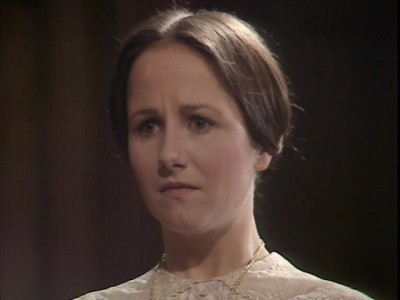
The tale begins with Jane's early childhood and mistreatment by her aunt. The production never rushes relaying these early, impacting moments which helps flesh out the title character; by the time Zelah Clarke takes over as the adult Jane Eyre, we already care a great deal for her, just by seeing the adversity she faced as a child. On the other hand, this slow buildup can be frustrating when the arrival of Timothy Dalton's character is much anticipated, but doesn't occur until 90-minutes or almost a third of the way through the production. However, once Dalton arrives and the he and Jane's tale can play out, the series doesn't disappoint.
While Zelah Clarke is tremendous in her role, Dalton's performance is far beyond what one could expect. There are times in these television productions that the actors appear very competent, but there is a slight hint that they aren't giving it their all. That couldn't be further from the truth in Dalton's case. He plays the role of Rochester with intensity fit for the big screen. In one of the series' key scenes, Rochester's proposal to Jane, Dalton's voice quivers with nervousness as he attempts to maintain his stoic, confidence. Bronte's material can, to modern viewers seem melodramatic, with great deals of slow romance, but it is through the strengths of Dalton and Clarke that the material doesn't wind up mistreated through hammy delivery.

Like other Bronte sisters' works, "Jane Eyre" will tear at the hearts of the viewers with dramatic twists and the agonizing torture of the heart the characters must face while seeking peace and love. The length of the production does come into play with such material and if it wasn't for the great performances and quite superior costume and set design, I'd have been wishing for a more abridged production. When the series finally wrapped after 5-hours, I had to stop and ask myself if literal adaptations are sometimes just too much. I do see there is a valid argument to be made for the more abridged adaptation, since the core themes of love and personal strength are universal. That is not to say "Jane Eyre" is not good because it's long; quite the opposite is true, but there are a handful of times, namely towards the latter half of the series during Jane's time with the Rivers' that the series just fails to meet the mark of a masterpiece such as the 1995 BBC production of "Pride and Prejudice."
All in all, "Jane Eyre" is very well produced, masterfully acted, epic telling of Charlotte Bronte's masterpiece. I find it's safe to assume fans of the novel will be pleased at the depth and scope this production takes to tell Jane's tale. For those like myself, unfamiliar with the original source material, if one can handle the 5-hour runtime, there time will not have been wasted. At the very least, Timothy Dalton himself, is worth the purchase price.
RATING: 4.0/5.0
Wuthering Heights (Emily Bronte)
This 1967 BBC adaptation of "Wuthering Heights" was my first exposure to the famous (and sole) story by Emily Bronte, sister of Charlotte. I would have likely passed this production by altogether had it not been for the film's lead actor, a very young Ian McShane. In doing a bit of research on the novel and previous attempts at adapting it to television and film, I found that this adaptation had the distinction of being one of the longest, clocking it at a hair over three hours. The three major motion picture adaptations, all came at nearly 104 minutes exactly, and the more recent adaptation starring Tom Hardy, produced for public television falls in between those film versions and this one, at 142 minutes. After finishing this adaptation, it became very clear that material cut from these shorter films, end up making this, I dare say, epic production a much more faithful telling of Bronte's novel.
Divided into four, 45 minute episodes, "Wuthering Heights" spans roughly three decades telling the story of Heathcliff (Ian McShane), one of the most complex and mysterious characters I've witnessed put on screen. Heathcliff comes into the lives of the Earnshaws as a young Gypsy boy, found by the patriarch of the family on his return home to his wife and two children, Hindley and Catherine. The family is instantly opposed to the addition of this feral looking child, and over the course of Heathcliff's young life, he is the victim of constant abuse from Hindley and the snickering Catherine. The first installment in this adaptation sets the stage for the following three episodes by unfolding the events of the Earnshaw children's lives as late teens. If there is a single weak link in the entire production it is here, with the principal cast failing to convincingly play 16 and 17 year olds. Angela Scoular's portrayal of a young Catherine is almost unsettling, as she clearly looks 10 years older than the character she is playing.
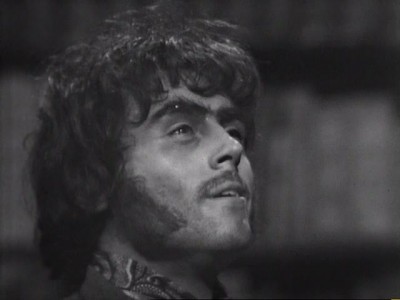
This misstep winds up hurting the beginning of the second episode in which Heathcliff returns from a self-imposed exile to unfold an intricate, chilling plot of revenge on not only the life of former tormentor Hindley, but also the family Catherine married into on his absence. McShane manages to find a firm hold on the character in these latter episodes, but it remains hard to convincingly understand why he has any feelings for Catherine in the first place. Whether it due to Bronte's original creation of the Catherine character or Scoular's shrill performance, the viewer will fight the urge to yell at Heathcliff to leave these miserable people and make his own life.
Fortunately, once Heathcliff firmly sinks his talons into key figures at both Wuthering Heights (his family home) and Thrushcross Grange (the home of Catherine's husband Edgar Linton), the viewer finds out how delicious such a vile tale can be. McShane slowly transforms from the heartsick, object of pity, to an obsessed, morally absent, master manipulator. It's never quite clear whether Heathcliff's actions are the result of a cunning psychopath or simply a man consumed by his own sorrow, driven to madness. At his worst, McShane's performance shows shades of the fierce intensity that would be more fully developed as Al Swearengen on "Deadwood." However, I dare say Heathcliff is a far more frightening presence than Swearengen, despite the latter's known proclivities to murder.
Heathcliff's manipulation of anyone and everyone remind me of one of modern television's most infamous soap opera villain's, Victor Newman. In fact, the plot of love, betrayal, power and revenge that populates "Wuthering Heights" shows up on a regular basis in the modern soap opera. They are timeless themes, and here, they are played out in full, even up until the final, chilling scene. I defy anyone who hasn't read nor seen an adaptation of this story to be able to guess what Heathcliff will do next; there is no depth to which he won't sink; using his sick, dying son as a pawn in his mad game is just one of many sins he commits.
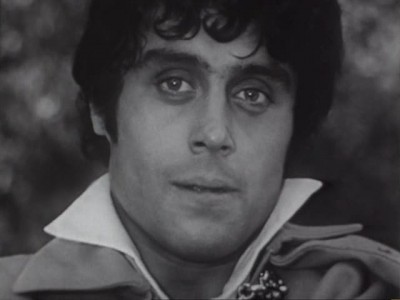
Peter Sasdy completes the puzzle as director of this adaptation and manages to spice things up with some small, but effective filming techniques. I didn't expect much in terms of camera work or editing on a BBC television production from over 40 years ago, but there are moments in "Wuthering Heights" that makes one wonder how polished a production Sasdy could have unleashed on the big screen. Despite the shaky performances in the first episode involving Heathcliff and Catherine's stunning, quick forming romance, these scenes remain memorable due to Sasdy's variety of camera shots. His work ranges from close-ups of the couple sharing intimate conversation, to wide shots where the duo remain a speck on the barren landscape, conveying the sense that at this moment, they are alone in their love. Heathcliff's return from exile is an additional highlight, shot first person with each of our principal characters reactions being shown raw and unembellished. Mostly though, Sasdy knows how to frame characters in a scene and use close-ups to add emotional or thematic emphasis.
"Wuthering Heights" is by no means a mainstream production. It's considerable length, and slow, unfolding plot is likely to fall flat on mainstream tastes. However, for fans of slow burns and character studies, it's a treat to say the least. I can't say this is a 100% faithful adaptation, as I've yet to read the novel, but it's a compelling enough production that has instilled great interest in me to check out this legendary tale. In short, it's good, well made entertainment.
RATING: 4.0/5.0
The Tenant of Wildfell Hall (Anne Bronte)
Embarrassingly, I had not heard of Anne Bronte until this set made it into my hands. Anne Bronte wrote her second and final novel, "The Tenant of Wildfell Hall" under the pen name of Acton Bell. Like the works of her two sisters, "The Tenant of Wildfell Hall" deals with the themes of love and class. This adaptation, one of only two, was produced in 1996 and stars Tara Fitzgerald as Helen Graham, a woman of remarkable resolve and mystery. Arriving amidst murmurs at the titular estate, Graham immediately attracts the affectionate attention of Gilbert Markham (Toby Stephens), while at the same time attracting some more negative feelings from the town's other inhabitants, mostly due to her shifting the eye of Markham away from the Reverend's daughter.
The most striking aspect of this production is the character of Helen Graham herself. Whereas in Anne Bronte's sisters' productions, men often come across as the dominant forces in the story, my preconceived notion of Victorian women was shattered here. Graham is fiery, fiercely protective of herself and beloved son Arthur. Initially, Graham is an unlikable character, coming off as stuck up and prudish, but as the viewer is tossed brief flashbacks of her former life, we get a more clear picture, that this is a woman who chose not to succumb to the role of complacent, object. She is determined to survive on her own and we can see her desire to have purpose in the scenes where she paints, while other women idly sit by gossiping over tea. Tara Fitzgerald deserves great credit for bringing the character to life and her performance reminds me of the dignity of a young Helena Bonham Carter mixed with the resolve of an Aliens-era Sigourney Weaver; an odd analogy to say the least, but this is far fro a shallow character.
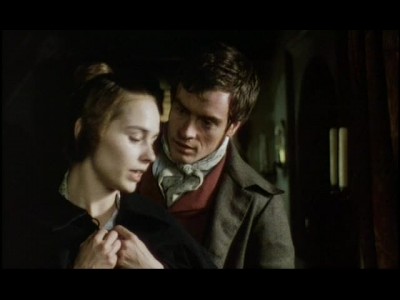
It is not long before romance blossoms between Graham and Markham, but as to be expected from a Bronte family story, that relationship can never be simple. In the production's first of three, 50-minute episodes, Graham's arrival, blossoming, slow relationship with Markham, and the enigma that is her past are well woven into a truly gripping package. When the episode comes to a close and the first big twist in the road occurs, it's not until the credits roll that one realizes the reveal is rather cliché, but the buildup is where the true artistry lies.
Graham becomes a more complete story herself as episodes two and three unfold what really happened between herself, her husband, Huntingdon (an enjoyably vile, Rupert Graves). While the mystery of the production's first act is greatly missed in the final two acts, the performances and raw (for Victorian standards) nature of the tale told more than make up for the loss. Huntingdon is a beast of a man and seems to revel in his immorality and the misery he bestows on a woman who blindly loves him. He is possessive of this misery and willing to use his own son to keep it alive. In many ways he reminds me of the evil side of Heathcliff from "Wuthering Heights."
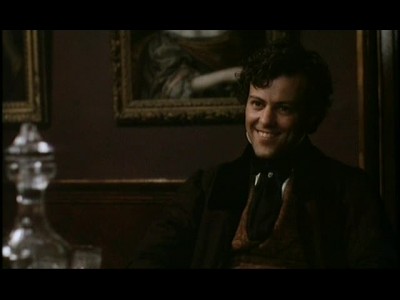
As real as the emotions and performances are, so is the filming style. It's a fine example of modern storytelling, far removed from the dialogue heavy, stage-like productions such as "Wuthering Heights." Director Mike Barker keeps things very natural looking with dark interiors lit by candle, supplements the mystery of the story and score with ominous exterior montages, and evokes a feeling of both wealth and sickness during the flashbacks to Helen's marriage to Huntingdon. In contrast, the rundown Wildfell Hall, feels more inviting, a great testament to cinematography evoking emotions.
While not nearly as intense as "Wuthering Heights" or refined as "Jane Eyre," "The Tenant of Wildfell Hall" stands shoulder to shoulder with these fine adaptations in it's own right. It's a no-punches pulled, classic tale, that in many aspects will speak to modern audiences with greater ease. The characters feel real and we feel for the ones who deserve our sympathy.
RATING: 4.0/5.0
THE DVD
The Video
Jane Eyre (Charlotte Bronte)
The 1.33:1 transfer preserves the original television production aspect ratio and shows all the telltale signs of being a video transfer. There are some noticeable compression artifacts, but most distracting are the comet trail effects present when candles are in shot. The color level is heavily muted and detail is on par with video levels. There is some noticeable camera wobble during the opening credits and during a handful of scenes, but this is inconsistent and it's unknown whether it's a result of the transfer or was present in the original source material.
RATING: 2.5/5.0
Wuthering Heights (Emily Bronte)
The 1.33:1 transfer retains the original aspect ratio this 1967 BBC television production. Interior shots are the most visually appealing, although like the rest of the program suffer from noticeable print damage and varying detail levels. Contrast levels also vary quite a bit, most noticeably in the scenes on location. It is nearly impossible to pick out any bit of detail when characters are a moderate distance from the camera and in daylight scenes, some shots look overexposed. It's worth noting that despite some noticeable telecine wobble during the opening and closing credits, the vast majority of the program flows smoothly. To sum it up nicely, for a 40 year old British TV production it is better than expected, but could have used some remastering.
RATING: 2.5/5.0
The Tenant of Wildfell Hall (Anne Bronte)
The 1.78:1 non-anamorphic widescreen transfer is the most disappointing of this set. Aside from the obvious lack of anamorphic enhancement which has been standard for many years now, the level of detail is quite lacking and colors appear far more muted than they should; this is most evident in scenes where candlelight makes up the sole source of light. I noticed more than a few compression artifacts and during some close-ups hints and digital noise reduction. It's a shame, as the production is wonderfully filmed, and this overall, flat looking affair undermines the hard work that went into creating the end result.
RATING: 2.5/5.0
The Audio
Jane Eyre (Charlotte Bronte)
The 2.0 Dolby Digital English audio track comes off as slightly flat and exhibits some crackling on the most shrill of sounds. Dialogue for the most part is easily understood, but suffers from echoing on occasion, likely due to set design. Unfortunately, no subtitles are available, so those who struggle with English accents, be forewarned.
RATING: 2.5/5.0
Wuthering Heights (Emily Bronte)
The English mono soundtrack features a noticeable, soft background hiss, a likely reminder of the equipment used to film the program. Voices are for the most part clear, although sound quality takes a nosedive during outdoor scenes. There is bit of distortion when the occasional shrill scream or thin gust of wind rips through an open window. English subtitles for the hearing impaired are included.
RATING: 2.0/5.0
The Tenant of Wildfell Hall (Anne Bronte)
The 2.0 Dolby Digital English audio track is much more adequate than the video quality. As a dialogue heavy presentation, everything is solid, well mixed (although hushed dialogue is a bit soft in a small handful of scenes), and clear. Accents were easily distinguishable and when the pleasant, yet mysterious score was called into action, the overall mix showed more life than expected. English subtitles for the hearing impaired are included as well.
RATING: 3.5/5.0
The Extras
None.
Final Thoughts
"The Bronte Collection" is quite a good value for the quality of storytelling and acting presented over it's collected 11-hour runtime. By being able to see the works of these three sisters played out in the dramatic medium, one finds themselves having a great deal of respect for all three sisters. As I had stated previously, I was only familiar with "Jane Eyre" and had never even heard of Anne Bronte before picking up this collection, so I found it fascinating to see how skilled each sister was in crafting their own take on very similar themes. Unfortunately the only downside to this set, is the less than stellar A/V quality for all three releases, with "The Tenant of Wildfell Hall" the most disappointing being the more recent production of the three. That shouldn't stop anyone from checking this set out though, as all three stories are solid entertainment. Recommended.
|
| Popular Reviews |
| Sponsored Links |
|
|
| Sponsored Links |
|
|
| Release List | Reviews | Shop | Newsletter | Forum | DVD Giveaways | Blu-Ray | Advertise |
|
Copyright 2024 DVDTalk.com All Rights Reserved. Legal Info, Privacy Policy, Terms of Use,
Manage Preferences,
Your Privacy Choices | |||||||









